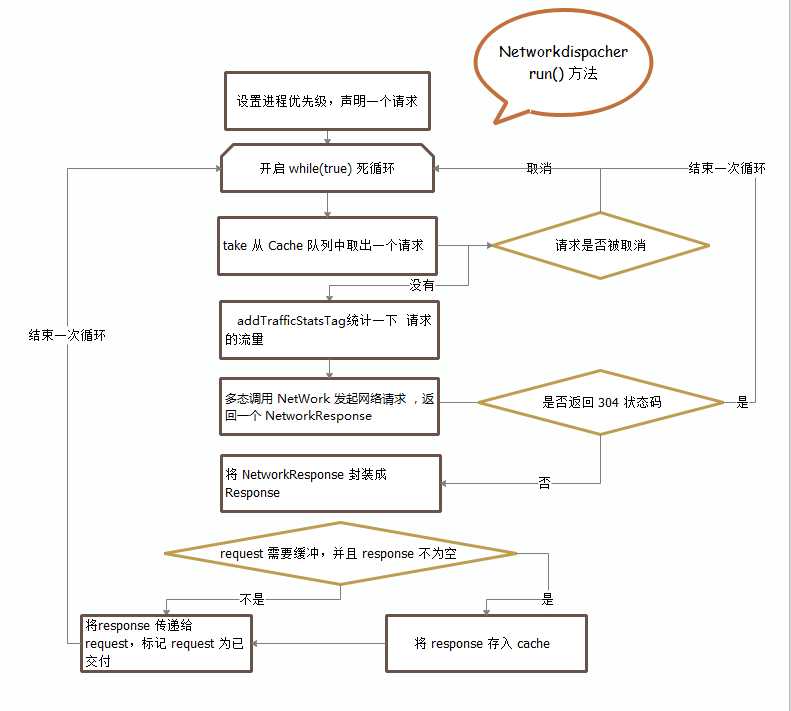201709021工作日记--Volley源码详解
Posted
tags:
篇首语:本文由小常识网(cha138.com)小编为大家整理,主要介绍了201709021工作日记--Volley源码详解相关的知识,希望对你有一定的参考价值。
学习完了CacheDispatcher这个类,下面我们看下NetworkDispatcher这个类的具体细节,先上代码:
/** * 提供一个线程执行网络调度的请求分发 * Provides a thread for performing network dispatch from a queue of requests. * * 请求被添加到了指定的队列中 * 返回的数据通过ResponseDelivery接口返回 * Requests added to the specified queue are processed from the network via a * specified {@link Network} interface. Responses are committed to cache, if * eligible, using a specified {@link Cache} interface. Valid responses and * errors are posted back to the caller via a {@link ResponseDelivery}. */ public class NetworkDispatcher extends Thread { /** The queue of requests to service. */ private final BlockingQueue<Request<?>> mQueue; /** The network interface for processing requests. */ private final Network mNetwork; /** The cache to write to. */ private final Cache mCache; /** For posting responses and errors. */ private final ResponseDelivery mDelivery; /** Used for telling us to die. */ private volatile boolean mQuit = false; /** * 创建一个新的网络调度线程,必须调用start()方法开启处理线程 * Creates a new network dispatcher thread. You must call {@link #start()} * in order to begin processing. * * @param queue Queue of incoming requests for triage * @param network Network interface to use for performing requests 执行请求 * @param cache Cache interface to use for writing responses to cache * @param delivery Delivery interface to use for posting responses 结果返回 */ public NetworkDispatcher(BlockingQueue<Request<?>> queue, Network network, Cache cache, ResponseDelivery delivery) { mQueue = queue; mNetwork = network; mCache = cache; mDelivery = delivery; } /** * 防止超时还一直占用资源 * Forces this dispatcher to quit immediately. If any requests are still in * the queue, they are not guaranteed to be processed. */ public void quit() { mQuit = true; interrupt(); } @TargetApi(Build.VERSION_CODES.ICE_CREAM_SANDWICH) private void addTrafficStatsTag(Request<?> request) { // Tag the request (if API >= 14) if (Build.VERSION.SDK_INT >= Build.VERSION_CODES.ICE_CREAM_SANDWICH) { TrafficStats.setThreadStatsTag(request.getTrafficStatsTag()); } } @Override public void run() { Process.setThreadPriority(Process.THREAD_PRIORITY_BACKGROUND); while (true) { long startTimeMs = SystemClock.elapsedRealtime(); Request<?> request; try { // Take a request from the queue. // 获取一个请求消息 request = mQueue.take(); } catch (InterruptedException e) { // We may have been interrupted because it was time to quit. if (mQuit) { return; } continue; } try { request.addMarker("network-queue-take"); // If the request was cancelled already, do not perform the // network request.查看请求是否被取消掉了 if (request.isCanceled()) { request.finish("network-discard-cancelled"); continue; } addTrafficStatsTag(request); // Perform the network request. // 开始执行用户请求,并接受一个请求后的响应 NetworkResponse networkResponse = mNetwork.performRequest(request); request.addMarker("network-http-complete"); // If the server returned 304 AND we delivered a response already, // we‘re done -- don‘t deliver a second identical response. if (networkResponse.notModified && request.hasHadResponseDelivered()) { request.finish("not-modified"); continue; } // Parse the response here on the worker thread. // 对返回的响应进行处理 Response<?> response = request.parseNetworkResponse(networkResponse); request.addMarker("network-parse-complete"); // Write to cache if applicable. // 将返回的响应消息写入Cache缓存 // TODO: Only update cache metadata instead of entire record for 304s. if (request.shouldCache() && response.cacheEntry != null) { mCache.put(request.getCacheKey(), response.cacheEntry); request.addMarker("network-cache-written"); } // Post the response back. // 将响应信息返回 request.markDelivered(); mDelivery.postResponse(request, response); } catch (VolleyError volleyError) { volleyError.setNetworkTimeMs(SystemClock.elapsedRealtime() - startTimeMs); parseAndDeliverNetworkError(request, volleyError); } catch (Exception e) { VolleyLog.e(e, "Unhandled exception %s", e.toString()); VolleyError volleyError = new VolleyError(e); volleyError.setNetworkTimeMs(SystemClock.elapsedRealtime() - startTimeMs); mDelivery.postError(request, volleyError); } } } private void parseAndDeliverNetworkError(Request<?> request, VolleyError error) { error = request.parseNetworkError(error); mDelivery.postError(request, error); } }
网络调度线程也是从队列中取出请求并且判断是否被取消了,如果没取消就去请求网络得到响应并回调给主线程。请求网络时调用this.mNetwork.performRequest(request),这个mNetwork是一个接口,实现它的类是BasicNetwork,我们下一个就需要看看BasicNetwork的performRequest()方法。
下面这张图是网络调度线程的执行控制流图:

as
啊
啊
啊
啊
啊
啊
以上是关于201709021工作日记--Volley源码详解的主要内容,如果未能解决你的问题,请参考以下文章